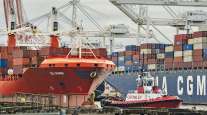Bloomberg News
Supply Chain Snags, Quarantines Hurt Global Air Cargo Growth

[Stay on top of transportation news: Get TTNews in your inbox.]
Global air cargo growth slowed sharply in November as demand was hit by supply chain disruptions, partly because COVID-19 restrictions left workers stuck in quarantine, causing labor shortages.
Demand for airfreight, measured in cargo ton kilometers, rose 3.7% from the same month in 2019, prior to the pandemic, according to the International Air Transport Association. That’s less than half the 8.2% increase seen in October and also significantly lower than in previous months, IATA said.
Freight has been a rare bright spot in a dark time for many of the world’s airlines, helping offset weak passenger traffic thanks to strong demand from consumers stuck at home. Economic conditions remain favorable, with China and the U.S. seeing double-digit growth in retail sales in November from two years prior, IATA noted, but clogged supply chains are pinching the business.
“The pressures of labor shortages and constraints across the logistics system unexpectedly resulted in lost growth opportunities,” IATA Director General Willie Walsh said in a statement dated Jan. 11. “Manufacturers, for example, were unable to get vital goods to where they were needed, including PPE,” he said, referring to personal protective equipment, demand for which has jumped due to a surge in COVID cases in many developed economies.
IATA, which represents about 290 airlines, called on governments to swiftly address supply chain pressures, including taking steps to ensure air crew operations aren’t hindered by COVID restrictions designed for travelers and providing policy incentives to address labor shortages.
Logistics snags also continue to affect sea transport. Containers spent five days on average at Chinese depots last year, compared with 61 days in 2020, which illustrates maxed-out capacity and pressure on the supply chain, according to a study by Germany-based Container xChange and Fraunhofer-CML.
While containers are moving in and out of China at record speeds, port congestion in the U.S. and Europe is slowing their return to Asia and hampering the recovery of global ocean supply chains, the study found.
“As the omicron variant brings more disruption, with Chinese New Year around the corner and some ports including Ningbo already facing lockdowns, we are expecting a volatile start to the year for ocean freight logistics,” Container xChange CEO Johannes Schlingmeier said in a statement.
Want more news? Listen to today's daily briefing below or go here for more info:




